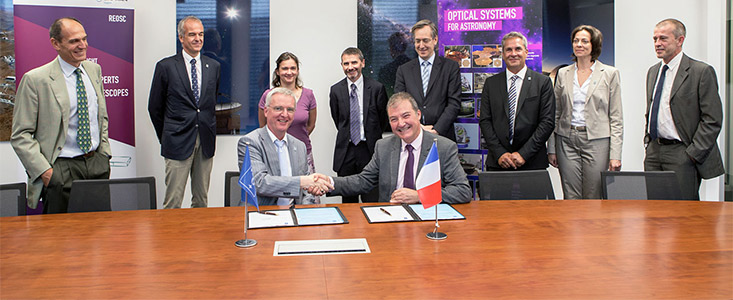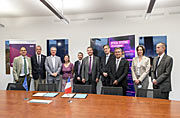Announcement
ESO Signs Contract for Deformable Shell Mirrors for E-ELT
8 July 2015
ESO has signed a contract with the French optics company Reosc, a subsidiary of Sagem, Safran group, to manufacture the deformable shell mirrors that will comprise the fourth mirror (M4) of the European Extremely Large Telescope (E-ELT) These mirrors will be mounted and supported in the adaptive mirror unit (ann15045) to form the largest ever adaptive mirror unit ever made.
The contract was signed by representatives of Reosc and ESO at a ceremony at ESO Headquarters on 8 July 2015.
The M4 deformable mirror system forms a key part of the E-ELT. Measuring 2.4 metres in diameter, it will be made up of six thin segment mirrors, each only 1.95 millimetres thick and made of ceramic glass. Each shell is one of six 60-degree petal sections that form the circular segmented M4 mirror.
SCHOTT will deliver pieces of ceramic to Reosc, then Reosc will manufacture and polish the thin shells. The AdOptica consortium in Italy — ADS International and Microgate, partnered with INAF (Istituto Nazionale di Astrofisica) as subcontractors — will produce the shell assemblies and build the entire support unit (ann15045).
The prototyping of this challenging mirror has been ongoing for several years. Reosc produced the first flat thin-shell mirror for the E-ELT programme already in 2008. This 1.95-millimetre thick, 1-metre diameter mirror was then cut into two petals and used for the demonstration prototype [1]. In 2010, Reosc successfully manufactured a 2.7-metre thin mirror made of borofloat glass and cut it into segments.
In 2011, Reosc then delivered the first thin shell for the deformable mirror of the Very Large Telescope (VLT). This aspheric mirror (ann12015) was coated and integrated in the support unit and has been under testing at ESO since the end of 2012 (potw1307a). A second thin-shell mirror for the VLT deformable secondary mirror (DSM) was delivered at the end of 2013 (ann14010), and will be tested at ESO in early 2016.
Reosc will manufacture twelve mirror shells for the E-ELT M4, planning to produce the first six mirrors within five years and to complete the manufacturing of the twelve mirrors by 2023.
Notes
[1] The petal installed on the demonstration prototype is shown in this picture.
Links
- Contract Signed for Final Design and Construction of Largest Adaptive Mirror Unit in the World
- ESO Awards Contract for E-ELT Adaptive Mirror Design Study
- E-ELT M4 (Microgate)
- An Expanded View of the Universe – Science with the European Extremely Large Telescope
- E-ELT Optical Design
- E-ELT Optomechanics Overview (M. Cayrel)
- Specifications and design of the E-ELT M4 adaptive unit (E. Vernet et al.)
Contacts
Elise Vernet
ESO, Adaptive Optics Department (Instrumentation)
Garching bei München, Germany
Tel: +49 89 320 06 322
Fax: +49 89 320 2362
Email: evernet@eso.org
Lars Lindberg Christensen
Head of ESO ePOD
Garching bei München, Germany
Tel: +49 89 3200 6761
Cell: +49 173 3872 621
Email: lars@eso.org
About the Announcement
| Id: | ann15055 |
Our use of Cookies
We use cookies that are essential for accessing our websites and using our services. We also use cookies to analyse, measure and improve our websites’ performance, to enable content sharing via social media and to display media content hosted on third-party platforms.
ESO Cookies Policy
The European Organisation for Astronomical Research in the Southern Hemisphere (ESO) is the pre-eminent intergovernmental science and technology organisation in astronomy. It carries out an ambitious programme focused on the design, construction and operation of powerful ground-based observing facilities for astronomy.
This Cookies Policy is intended to provide clarity by outlining the cookies used on the ESO public websites, their functions, the options you have for controlling them, and the ways you can contact us for additional details.
What are cookies?
Cookies are small pieces of data stored on your device by websites you visit. They serve various purposes, such as remembering login credentials and preferences and enhance your browsing experience.
Categories of cookies we use
Essential cookies (always active): These cookies are strictly necessary for the proper functioning of our website. Without these cookies, the website cannot operate correctly, and certain services, such as logging in or accessing secure areas, may not be available; because they are essential for the website’s operation, they cannot be disabled.
Functional Cookies: These cookies enhance your browsing experience by enabling additional features and personalization, such as remembering your preferences and settings. While not strictly necessary for the website to function, they improve usability and convenience; these cookies are only placed if you provide your consent.
Analytics cookies: These cookies collect information about how visitors interact with our website, such as which pages are visited most often and how users navigate the site. This data helps us improve website performance, optimize content, and enhance the user experience; these cookies are only placed if you provide your consent. We use the following analytics cookies.
Matomo Cookies:
This website uses Matomo (formerly Piwik), an open source software which enables the statistical analysis of website visits. Matomo uses cookies (text files) which are saved on your computer and which allow us to analyze how you use our website. The website user information generated by the cookies will only be saved on the servers of our IT Department. We use this information to analyze www.eso.org visits and to prepare reports on website activities. These data will not be disclosed to third parties.
On behalf of ESO, Matomo will use this information for the purpose of evaluating your use of the website, compiling reports on website activity and providing other services relating to website activity and internet usage.
Matomo cookies settings:
Additional Third-party cookies on ESO websites: some of our pages display content from external providers, e.g. YouTube.
Such third-party services are outside of ESO control and may, at any time, change their terms of service, use of cookies, etc.
YouTube: Some videos on the ESO website are embedded from ESO’s official YouTube channel. We have enabled YouTube’s privacy-enhanced mode, meaning that no cookies are set unless the user actively clicks on the video to play it. Additionally, in this mode, YouTube does not store any personally identifiable cookie data for embedded video playbacks. For more details, please refer to YouTube’s embedding videos information page.
Cookies can also be classified based on the following elements.
Regarding the domain, there are:
- First-party cookies, set by the website you are currently visiting. They are stored by the same domain that you are browsing and are used to enhance your experience on that site;
- Third-party cookies, set by a domain other than the one you are currently visiting.
As for their duration, cookies can be:
- Browser-session cookies, which are deleted when the user closes the browser;
- Stored cookies, which stay on the user's device for a predetermined period of time.
How to manage cookies
Cookie settings: You can modify your cookie choices for the ESO webpages at any time by clicking on the link Cookie settings at the bottom of any page.
In your browser: If you wish to delete cookies or instruct your browser to delete or block cookies by default, please visit the help pages of your browser:
Please be aware that if you delete or decline cookies, certain functionalities of our website may be not be available and your browsing experience may be affected.
You can set most browsers to prevent any cookies being placed on your device, but you may then have to manually adjust some preferences every time you visit a site/page. And some services and functionalities may not work properly at all (e.g. profile logging-in, shop check out).
Updates to the ESO Cookies Policy
The ESO Cookies Policy may be subject to future updates, which will be made available on this page.
Additional information
For any queries related to cookies, please contact: pdprATesoDOTorg.
As ESO public webpages are managed by our Department of Communication, your questions will be dealt with the support of the said Department.


